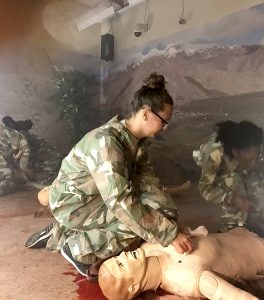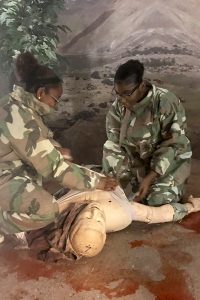Southern Regional AHEC Partners with HOSA to Train Cumberland County High School Students to Stop the Bleed

A person who is bleeding can die from blood loss within five minutes, therefore it is important to quickly stop the blood loss.
—U.S. Department of Homeland Security/Stop the Bleed
When Hurricane Florence blew through eastern North Carolina last September, many educational events were forced to cancel or reschedule due to the devastation caused by the storm. The local NC Chapter of the Health Occupations Students of America (HOSA) jumpstart events were no exception. Because these students were unable to attend the annual kickoff program marking the beginning of the school year, Southern Regional AHEC’s Health Careers and Workforce Diversity Director Tonya Burney worked with HOSA instructors in the Cumberland County Schools to find a replacement educational activity that would benefit students.
The collaboration between Burney, South View High School HOSA instructor Regina Smith, and Westover High School Health Science Academy teacher Kacheckia Dewitt resulted in the discovery of a nationally recognized training, Stop the Bleed,recently released by the U.S. Department of Homeland Security. The intention of the call-to-action program is to cultivate grassroots efforts that encourage bystanders to become trained, equipped, and empowered to help in a bleeding emergency before professional help arrives.

The program’s value was endorsed by other health occupations teachers who attended an education conference in the summer and joined one of the Stop the Bleed training sessions offered. With that information, the collaborating educators concluded that the Stop the Bleed program, which provides certification on how to respond, react and rescue individuals in a catastrophic emergency, would be a great opportunity for these students. Once the decision was made to provide Stop the Bleed training for the rescheduled event, students from Southern Regional AHEC’s nine-county region were invited to attend. The only stipulation was that the student must be a registered HOSA or Health Academy member.
More than 100 students from high schools in Bladen, Cumberland, Harnett, Hoke, Moore, Richmond, Robeson, Sampson, and Scotland counties took part in the session, held on Saturday, November 17, 2018, at the Medical Training Simulation Center at Fort Bragg. Because of the financial support from Southern Regional AHEC’s Health Careers and Workforce Diversity Program for this enrichment activity, all of the students attended the training at no cost.
First, student participants watched a 30-minute Stop the Bleed training video. Then, they received hands-on instruction from one of the trained HOSA advisors. After the students completed a hands-on activity, their training was put to the test. In a simulation room that mimicked a real-life IED explosion, the students used their new-found knowledge to stop the bleeding of mannequins. Fort Bragg simulation training personnel created a replication of a catastrophic event that was as close to reality as possible. Students heard the sound of an explosion, as well as moans and groans from the mannequins—as if they were real people. They saw smoke in the air. They also got bloody (simulated blood).
The students said they didn’t mind spending their Saturday in these dire conditions. They were there to learn.
“With all of the shootings happening in the United States, kids need to be prepared to jump in and help,” said Jacob McLain, a ninth grader from 71st High School in Cumberland County. “The Stop the Bleed program gave me the boost I needed. I found out that saving lives, even though it was a simulation, sparked something in me.”
Jacob believes his involvement with the TEACH program, a Health Careers and Workforce Diversity initiative at Southern Regional AHEC, has helped him decide on his career.
“I have learned so much in just these few months,” he said. “And I know, now, that a career in the health care field is what I am destined to do.”
The educators from the school system, from Southern Regional AHEC, the Fort Bragg Medical Training Simulation Center staff, and the HOSA program were also pleased that the event met their objective: to create an experience for students that would enhance lifesaving skills and bridge the gap between local HOSA organizations through collaboration, learning, and fun.
